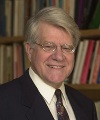Contacts

Orley Ashenfelter
Joseph D. Green 1895 Professor of Economics, Princeton University
Orley C. Ashenfelter is the Joseph Douglas Green 1895 Professor of Economics at Princeton University and Acting Director of the university's Industrial Relations Section. He has been director of the Office of Evaluation of the U.S. Department of Labor, a Guggenheim Fellow, and the Benjamin Meeker Visiting Professor at the University of Bristol. He is a recipient of the IZA Prize in Labor Economics, the Society of Labor Economists' Mincer Award for Lifetime Achievement and a Fellow of the Econometric Society, the American Academy of Arts and Sciences, the Society of Labor Economists, a Distinguished Fellow of the American Economic Association, and a Corresponding Fellow of the Royal Society of Edinburgh. He edited the Handbook of Labor Economics and was previously co-editor of the American Law and Economics Review and editor of the American Economic Review. He recently completed his term as President of the American Economic Association. Prof. Ashenfelter's areas of specialization include labor economics, econometrics, and law and economics, and his research includes many issues related to the economics of labor markets.
Orley Ashenfelter on CERGE-EI
“CERGE-EI is more than fulfilling its initial promise to provide top-quality Ph.D. education in economics to students from developing countries: the program is innovative in answering its students' needs and diligent in preparing them to serve as economic leaders for the future. Our goal at the foundation has been to permit this fledgling institute to support graduate students and faculty to build the infrastructure that was missing from the previously Communist states of much of Europe. I support the goal and I believe the Foundation has played a key role in permitting CERGE-EI to compete with institutions of Western Europe, which is critical to maintaining a presence in Eastern Europe. In all my experiences, the foundation has been cost effective, committed, and essential to its purpose.”









